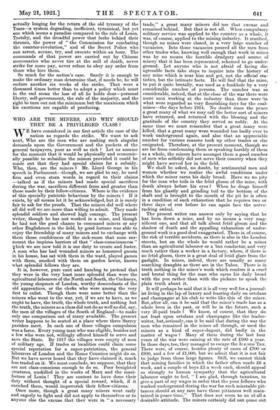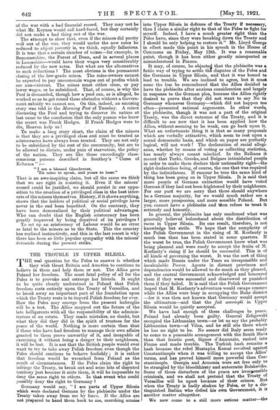WHO ARE THE MINERS, AND WHY SHOULD THEY BE A
PRIVILEGED CLASS ?
WE have considered in our first article the case of the nation as regards the strike. We want to ask next, Who are the men who are making such singular demands upon the Government and the pockets of the general taxpayers, poor as well as rich ? Let us assume for the moment that it would be physically and economic- ally possible to subsidize the miners provided it could be made out that they had special claims for a subsidy. Who, then, are the miners Mr. Lloyd George in his speech in Parliament—though, we are glad to say, he used firm and even stern words in regard to their claims —talked as if the miners had made special sacrifices during the war, sacrifices different from and greater than those made by their fellow-citizens. Where is the evidence of this specially patriotic behaviour by the miners ? If it exists, by all means let it be acknowledged, but it is surely fair to ask for the proofs. That the miners did well where all did well we are more than willing to admit. They made splendid soldiers and showed high courage. The present writer, though he has not worked in a mine, and though he had not the good chance to command miners or any other Englishmen in the field, by good fortune was able to enjoy the friendship of many miners and to exchange with them those confidences of the sick-room that soon sur- mount the impious barriers of that " class-consciousness " 'which we are now told it is our duty to create and foster. A man who has had wounded miners as honoured guests in his house, has sat with them in the ward, played games with them, smoked with them on garden lawns, knows what splendid fellows they are.
It is, however, pure cant and humbug to pretend that they were in the very least more splendid than were the agricultural labourers of the North and South, the Cockneys, the young shopmen of London, worthy descendants of the old apprentices, or the clerks who were among the very first to enlist. Though there were none better than the miners who went to the war, yet, if we are to have, as we ought to have, the truth, the whole truth, and nothing but the truth, the miners as a class did not do as well as did, say, the men of the villages of the South of England—to make only one comparison out of many available. The present writer happens to be seated at a place where three Surrey parishes meet. In each one of those villages compulsion was a farce. Every young man who was eligible, besides not a few who were not willingly offered himself to serve and save the State. By 1917 the villages were empty of men of military age. If trades or localities could claim some special reputation for a super-patriotism, the general labourers of London and the Home Counties might do so. But we have never heard that they have claimed it, much less traded on it. We must conclude, we suppose, that they are not class-conscious enough to do so. Poor benighted creatures, unskilled in the works of Marx and the mani- festoes of Lenin ! They are content to have done their duty without thought of a special reward, which, if it enriched them, would impoverish their fellow-citizens. Once more, though a great many miners went early and eagerly to fight and did not apply to themselves or to anyone else the excuse that they were in " a necessary trade," a great many miners did use that excuse and remained behind. But that is not all. When compulsory military service was applied to the country as a whole, it was, of course, applied to the mining industry. It resulted, though no mines were closed, in a very large number of vacancies. Into those vacancies poured all the men from other trades who, knowing well enough that work in mines was by no means the horrible drudgery and source of misery that it has been represented, schemed to go under- ground. Let anyone who is not afraid of facing dis- agreeable facts take steps to inquire into the history of any mine which is near him and get, not the official sta- tistics, but the intimate facts. He will find that the mine, to put it quite brutally, was used as a funkhole by a very considerable number of persons. The number was so considerable, indeed, that at the close of the war there were more men working at the industry than there were in what were regarded as very flourishing days for the coal- mines—the days before 1914. No doubt since the peace a great many of what we may call the better sort of miners have returned, and returned with the blessing and the gratitude of the country they served so nobly. At the same time we must remember that a great many were killed, that a great many were wounded too badly ever to work underground again, and also that an appreciable number for various reasons took up other trades or else emigrated. Therefore, at the present moment, though we are far from condemning them or speaking harshly of them as a whole, the miners have amongst them a good number of men who selfishly did not serve their country when they might have served her in the field.
We shall be asked, no doubt, by sentimental men and women whether we realize the awful conditions under which the miner earns his daily bread. Have we no pity for the man who toils in the fetid gloom of the mine, with death always before his eyes ? When he drags himself from his ghastly and grinding toil to the bottom of the shaft and is brought to the mouth of the pit he is often in a condition of such exhaustion that he requires two or three days of rest before he can again face the nerve- racking ordeal.
The present writer can answer only by saying that he has been down a mine, and by no means a very mag- nificent one, and that all talk about fetid gloom and the shadow of death and the appalling exhaustion of under- ground work is a good deal exaggerated. There is, of course, the risk of terrible accidents, as there is also in the London streets, but on the whole he would rather be a miner than an agricultural labourer or a 'bus conductor, and very much rather than a worker in a factory, where, if there is no fetid gloom, there is a great deal of fetid glare from the gaslight. In mines, indeed, there are usually as many searching draughts as there are in the Tubes. There is in truth nothing in the miner's work which renders it a cruel and brutal thing for the man who earns his daily bread with the pen rather than with the pickaxe to speak the plain truth about it.
It will perhaps be said that it is all very well for a journal- ist living in the lap of luxury and feasting daily on ortolans and champagne at his club to write like this of the miner. But, after all, can it be said that the miner's trade has as a whole been in the past, or will be in the future, such a very ill-paid trade ? We know, of course, that they do not feast upon ortolans and champagne like the leader- writer, but, seriously, can it be said that during the war the men who remained in the mines all through, or used the miners as a kind of super-dugout, did badly in the matter of wages ? Many of them during the last four years of the war were earning at the rate of IWO a year. In those days, too, they managed to escape the It c3me Tax. There were, of course, besides plenty of cases of £700 or £800, and a few of £1,000, but we admit that it is not fair to judge from those large figures. Still, we cannot think that mining families in which the father often made £6 a week, and a couple of boys f,3 a week each, should appeal so strongly to human sympathy that the agricultural labourer ought to feel, " I am glad, through taxation, to give a part of my wages in order that the poor fellows who worked underground during the war for such miserable pit- tances should at any rate have these pittances well main- tained in peace time." That does not seem to us at all a desirable attitude. The miners certainly did not come out of the war with a bad financial record. They may not be what Mr. Keynes would call hard-faced, but they certainly did not make a bad thing out of the war. The attempt to show that, even if the miners did pretty well out of the war, they would under the new rates be reduced to abject poverty is, we think, equally fallacious. It is true that a certain number of mines—for example, in Somersetshire, the Forest of Dean, and in several places in Lancashire—would have their wages very considerably reduced by the new rates. But what are the alternatives to such reductions ? The most obvious is the permanent closing of the low-grade mines. The mine-owners cannot be expected to pay uneconomio wages out of profits which are non-existent. The mines must either close, or pay lower wages, or be subsidized. That, of course, is why the Pool is demanded, though how a pool can, as is alleged, be worked so as to get round these obstacles without a Govern- ment subsidy we cannot see. On this, indeed, an amusing story was told in the Morning Post of Tuesday. A miner discussing the Pool and trying to discover its nature at last came to the conclusion that the only person who knew the secret was Frank Hodges. If Frank Hodges were to die, Heaven help us! • To make a long story short, the claim of the miners is that they are a privileged class and must be treated as aristocracies have always been treated. They are not only to be subsidized by the rest of the community, but are to be allowed to dictate, under pain of starvation, the policy of the nation. They are like those exceedingly class- conscious persona described in Southey's " Curse of Kehama " :- " I am a blessed Glendoveer,
'Tis mine to speak, and yours to hear."
That is an awe-inspiring claim, but all the same we think that we are right in resisting it. Even if the miners' record could be justified, we should persist in our oppo- sition to the creation of a privileged class in the best inter- ests of the miners themselves. History, if it shows anything, shows that the holders of political or social privilege have never in the end been benefited. On the contrary, they have been demoralized by their political advantages. Who can doubt that the English aristocracy has been greatly improved by being deprived of its privileges ? To set up an aristocracy of Labour would be an error as fatal to the miners as to the State. This the country has realized instinctively, and this in the last resort is why there has been so little popular sympathy with the miners' demands during the present strike.



































 Previous page
Previous page